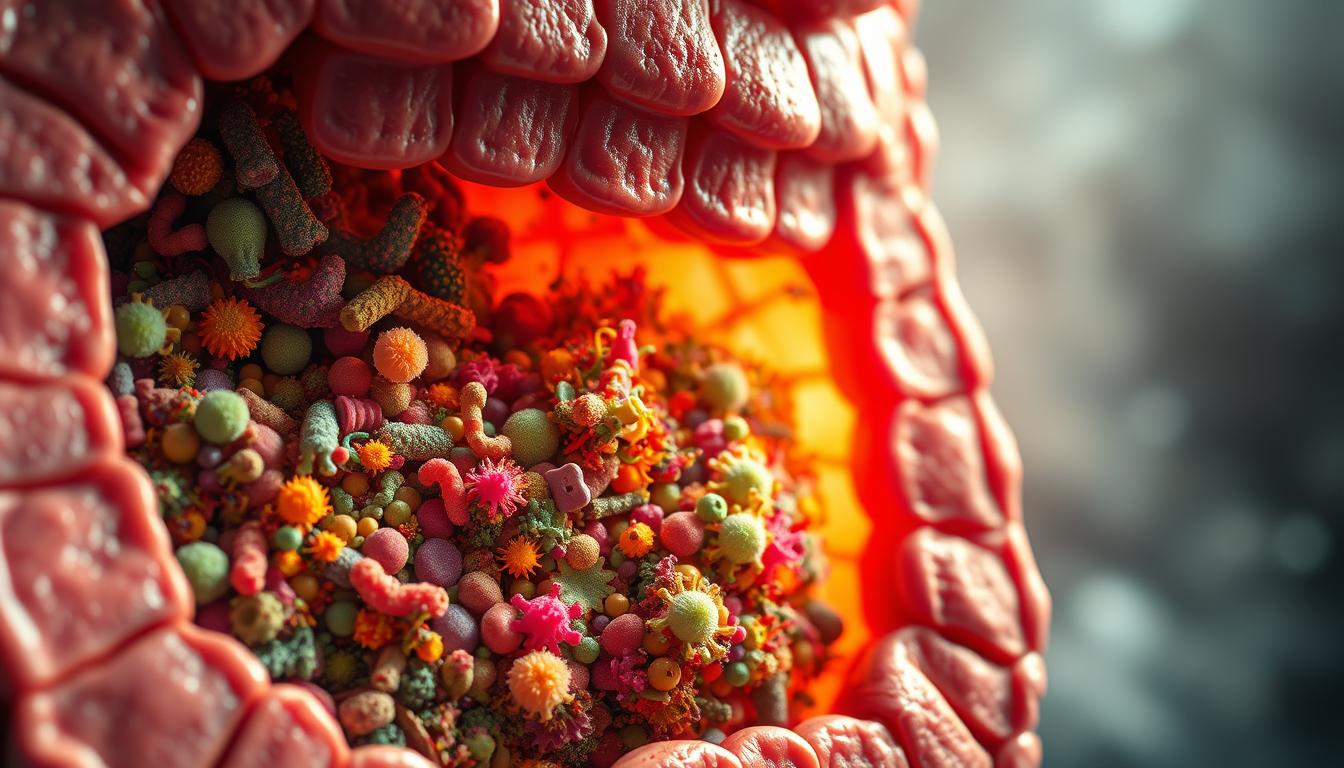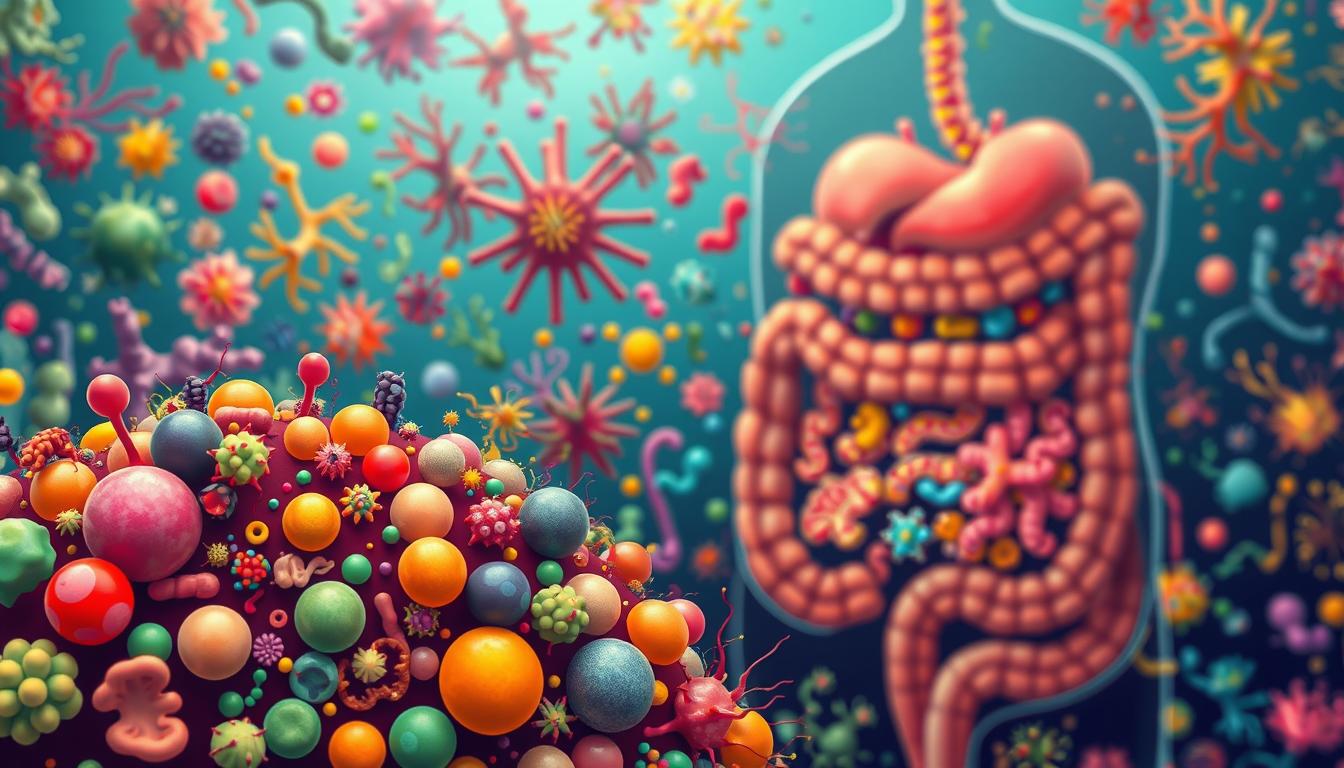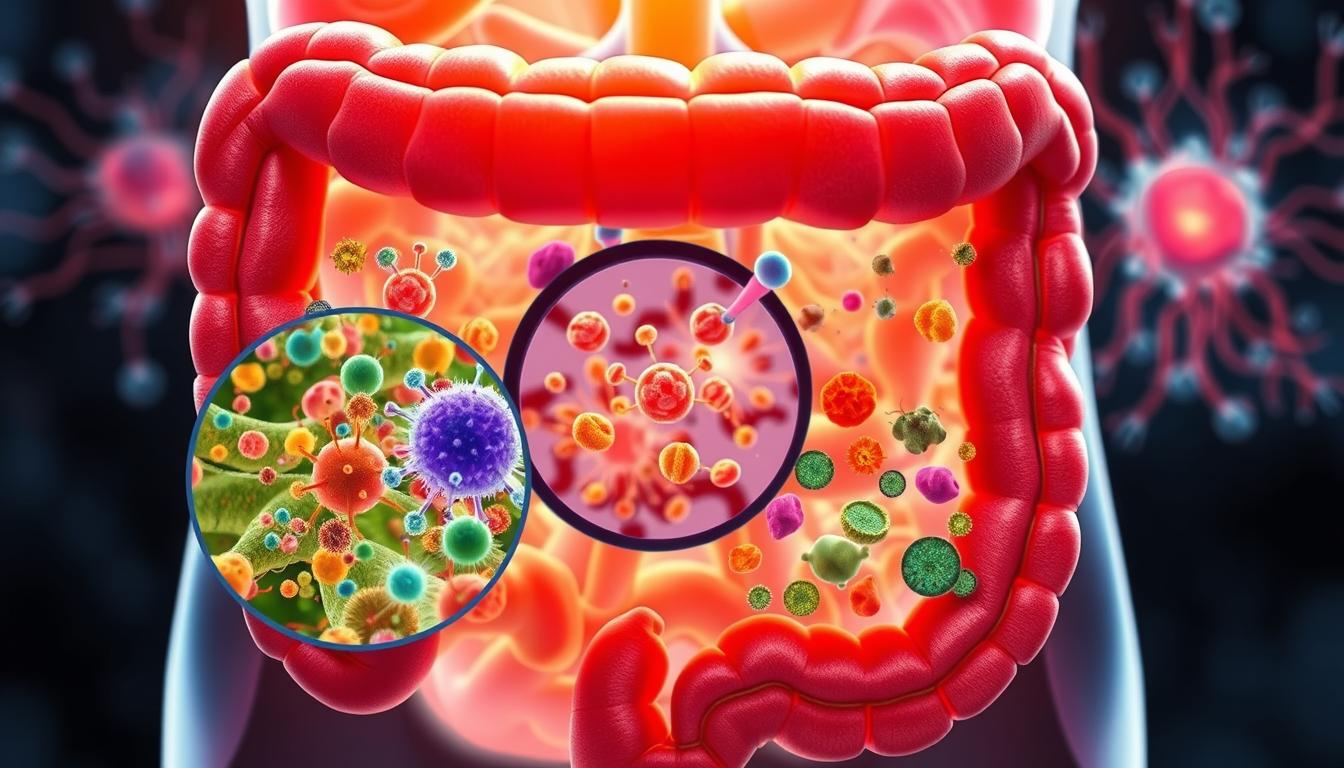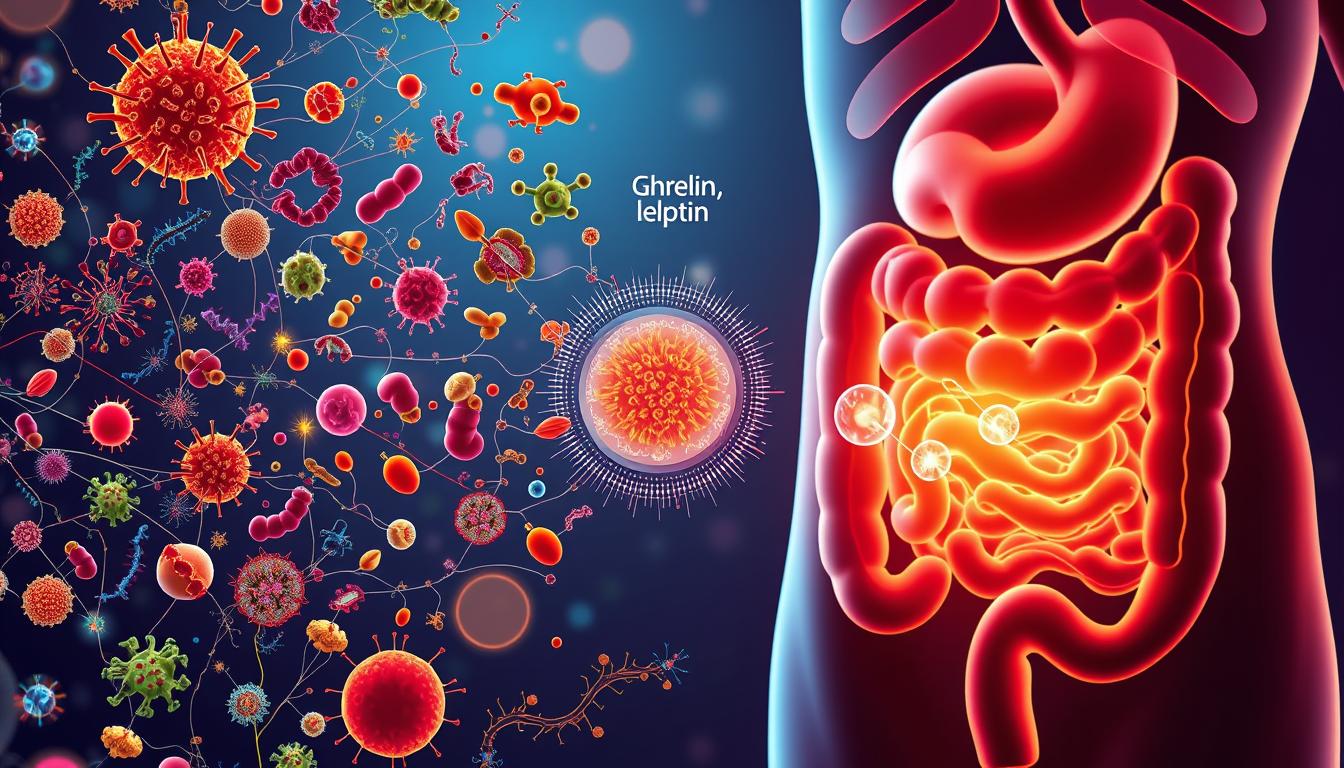Did you know that your gut bacteria could be the key to managing your weight? A groundbreaking study by ZOE found that 15 specific “good” gut microbes are linked to lower body weight. This discovery highlights the critical role of the gut microbiome in weight management.
The gut microbiome influences how your body absorbs nutrients, stores fat, and sends hunger signals. A diverse and balanced gut bacteria can help reduce inflammation and support a healthy immune system. This, in turn, can improve your metabolism and aid in sustainable weight loss.
The American Medical Association (AMA) emphasizes the importance of gut health in overall well-being. By focusing on nutrition, probiotics, and prebiotics, you can enhance your gut bacteria diversity. This approach not only supports weight loss but also boosts your overall health.
Understanding the connection between gut health and weight loss can empower you to make informed choices. Stay tuned for actionable strategies to improve your gut health and achieve your weight loss goals.
Key Takeaways
- The gut microbiome plays a crucial role in weight management.
- Specific gut microbes are linked to lower body weight.
- Gut bacteria affect nutrient absorption, fat storage, and hunger signals.
- A diverse gut microbiome reduces inflammation and supports immunity.
- Nutrition, probiotics, and prebiotics can enhance gut health.
- Improving gut health can aid in sustainable weight loss.
Introduction: The Connection Between Gut Health and Weight Loss
The trillions of microorganisms in your gut play a pivotal role in managing your weight. In fact, the average adult has about 40 trillion bacterial cells, outnumbering human cells by a ratio of 1.3:1. This vast ecosystem, known as the microbiome, is essential for maintaining overall well-being.

These bacteria do more than just aid digestion. They produce essential nutrients like vitamin K and help regulate your immune system. A balanced microbiome can reduce inflammation and support metabolic functions, which are critical for maintaining a healthy weight.
The Role of Gut Bacteria in Your Body
Research from ZOE highlights the importance of specific microbes in weight management. They identified 15 “good” and 15 “bad” gut bacteria linked to visceral fat levels. This discovery underscores how the microbiome influences fat storage and nutrient absorption.
The American Medical Association (AMA) warns that an imbalance in gut bacteria, known as dysbiosis, can lead to symptoms like persistent bloating. Addressing this imbalance through diet and lifestyle changes can improve your microbiome and support weight loss efforts.
Understanding the Gut Microbiome
The gut microbiome is a complex ecosystem that influences many aspects of your well-being. It consists of trillions of microorganisms, including bacteria, viruses, and fungi, that reside primarily in your digestive tract. These microorganisms play a critical role in maintaining balance and supporting essential bodily functions.

Most of these microorganisms are concentrated in the cecum and large intestine. The cecum, a pouch-like structure at the beginning of the large intestine, houses the majority of gut bacteria. This area is a hub for microbial activity, where nutrients are broken down and absorbed.
What Is the Gut Microbiome?
Your microbiome is as unique as your fingerprint. It begins to form at birth and evolves throughout your life. Factors like diet, environment, and genetics shape its composition. A diverse microbiome is linked to better health, while low diversity is often associated with metabolic disorders and disease.
How Gut Bacteria Influence Your Health
Gut bacteria play a dual role in your body. Beneficial strains support digestion, produce essential nutrients, and strengthen the immune system. On the other hand, pathogenic strains can cause inflammation and contribute to chronic conditions.
Stool analysis, such as fecal calprotectin tests, can measure gut inflammation and provide insights into your microbiome’s health. These tests help identify imbalances that may affect your overall well-being.
| Beneficial Strains | Pathogenic Strains |
|---|---|
| Support digestion | Cause inflammation |
| Produce nutrients | Contribute to disease |
| Boost immune system | Disrupt gut balance |
Understanding the gut microbiome is the first step toward optimizing your health. By nurturing a diverse and balanced microbial community, you can support your body’s natural functions and improve your overall well-being.
How Gut Bacteria Affect Digestion and Weight
The balance of bacteria in your digestive system plays a critical role in how your body processes food and stores fat. These microorganisms break down dietary components, extract nutrients, and influence metabolic pathways. Understanding their function can help you make informed choices about your diet and lifestyle.

The Role of Gut Bacteria in Food Digestion
Your gut bacteria are essential for breaking down complex carbohydrates, proteins, and fats. For example, Prevotella bacteria are particularly efficient at digesting fiber, which can aid in weight management. Studies show that a higher Prevotella to Bacteroidetes ratio is linked to successful weight loss.
Bacterial fermentation of flavonoids, found in fruits and vegetables, also provides metabolic benefits. This process produces short-chain fatty acids (SCFAs), which support gut lining integrity and reduce inflammation. A healthy gut lining ensures efficient nutrient absorption and prevents fat storage.
How Gut Bacteria Influence Fat Storage
Research reveals that the composition of your gut bacteria can determine how your body stores fat. For instance, mice studies show that transplanting obesity-related microbiomes into lean mice leads to weight gain. This highlights the direct impact of bacterial profiles on fat absorption.
High-fiber diets, which promote beneficial bacteria, are associated with greater fat loss. A study found that individuals on high-fiber diets lost an average of 5.1 pounds more than those on low-fiber diets. This underscores the importance of dietary choices in shaping your microbiome and managing weight.
| Beneficial Bacteria | Impact on Weight |
|---|---|
| Prevotella | Enhances fiber digestion, supports weight loss |
| Bacteroidetes | Linked to fat storage when dominant |
| SCFA-producing bacteria | Reduces inflammation, improves gut lining |
“The gut microbiome is a key player in how our bodies process food and store fat. By nurturing beneficial bacteria, we can support healthier weight management.”
By focusing on a diet rich in fiber and nutrients, you can promote a diverse and balanced microbiome. This not only aids digestion but also helps regulate fat storage and supports overall well-being.
The Link Between Gut Bacteria Diversity and Weight
The variety of microorganisms in your digestive system plays a crucial role in weight management. A diverse microbiome is linked to better overall health and efficient metabolic functions. Research shows that lower microbial diversity is often associated with conditions like obesity and metabolic disorders.

Why Diversity in Gut Bacteria Matters
Microbial diversity ensures a balanced ecosystem in your digestive tract. This balance supports nutrient absorption, reduces inflammation, and strengthens the immune system. Studies, such as the 77 twin pairs research, reveal that obesity correlates with reduced microbial variety.
Short-chain fatty acids (SCFAs) are essential byproducts of bacterial fermentation. Reduced SCFA-producing strains can lead to a “leaky gut,” where harmful substances enter the bloodstream. This condition is linked to inflammation and weight gain.
How Obesity Affects Gut Bacteria Diversity
Obesity often leads to a less diverse microbiome. ZOE’s research identifies microbiome richness as a key indicator of health. A study comparing microbial metrics across BMI categories found that higher BMI individuals had fewer beneficial strains.
Antibiotic use can also disrupt microbial balance, leading to dysbiosis. The AMA links this imbalance to conditions like IBS and inflammatory diseases. Maintaining a diverse microbiome through a fiber-rich diet can help counteract these effects.
| BMI Category | Microbial Diversity | Key Findings |
|---|---|---|
| Normal | High | Greater SCFA production, reduced inflammation |
| Overweight | Moderate | Fewer beneficial strains, moderate SCFA levels |
| Obese | Low | Reduced diversity, higher inflammation markers |
“A diverse gut microbiome is essential for maintaining metabolic health and preventing weight-related disorders.”
By focusing on strategies to enhance microbial diversity, you can support your body’s natural functions and improve weight management outcomes.
Gut Bacteria and Inflammation: The Weight Loss Connection
Chronic inflammation is a hidden factor that can sabotage your weight loss efforts. When your body is inflamed, it struggles to process nutrients and regulate fat storage. This often leads to weight gain and other metabolic issues.

How Inflammation Impacts Weight Gain
Inflammation occurs when harmful bacteria produce toxins like lipopolysaccharides (LPS). These toxins enter the bloodstream, triggering insulin resistance. This makes it harder for your body to burn fat efficiently.
Research shows that overweight individuals often have higher levels of C-reactive protein (CRP), a marker of inflammation. Elevated CRP levels are linked to increased fat storage and a slower metabolism.
The Role of Gut Bacteria in Reducing Inflammation
Not all bacteria contribute to inflammation. Strains like Akkermansia and Bifidobacteria play a protective role. Akkermansia strengthens the gut barrier, preventing harmful substances from entering the bloodstream.
Studies on mice reveal that Akkermansia reduces inflammation and improves metabolic health. Similarly, Bifidobacteria help prevent endotoxemia, a condition caused by toxins leaking into the blood.
| Pro-Inflammatory Bacteria | Anti-Inflammatory Bacteria |
|---|---|
| LPS-producing strains | Akkermansia |
| Triggers insulin resistance | Strengthens gut barrier |
| Increases CRP levels | Reduces inflammation |
“A balanced gut microbiome can reduce inflammation and support healthier weight management.”
By nurturing beneficial bacteria through a diet rich in fiber, probiotics, and prebiotics, you can combat inflammation. This not only aids weight loss but also boosts your overall health.
How Gut Bacteria Influence Hunger and Fullness
Your hunger and fullness signals are deeply influenced by the bacteria in your digestive system. These microorganisms play a key role in regulating appetite and energy balance. Understanding this connection can help you make smarter dietary choices.

Research shows that certain bacterial metabolites, like short-chain fatty acids (SCFAs), directly impact how your body signals hunger. SCFAs are produced when bacteria ferment dietary fiber, and they play a dual role in appetite regulation.
The Role of Short-Chain Fatty Acids
SCFAs, such as propionate, are essential for maintaining a healthy appetite. Studies reveal that propionate supplementation increases the production of hormones like PYY and GLP-1. These hormones signal fullness to your brain, reducing cravings and overeating.
For example, consuming 16 grams of daily prebiotics can boost satiety hormones significantly. This effect is linked to the fermentation of fiber by beneficial bacteria in your gut. A fiber-rich diet not only supports digestion but also helps control hunger.
How Gut Bacteria Affect Appetite Hormones
Your gut bacteria also influence hormones like ghrelin, which triggers hunger. A balanced microbiome ensures proper regulation of these hormones, preventing spikes in appetite. ZOE’s personalized nutrition program, which focuses on microbial balance, has helped participants lose an average of 9.4 pounds.
Clinical trials show that prebiotic-induced PYY levels can reduce hunger effectively. By nurturing beneficial bacteria through dietary fiber, you can achieve a healthier appetite balance and support weight management.
| SCFA Type | Effect on Appetite Hormones | Impact on Hunger |
|---|---|---|
| Propionate | Increases PYY/GLP-1 | Reduces cravings |
| Butyrate | Supports gut lining | Prevents overeating |
| Acetate | Regulates ghrelin | Controls hunger signals |
“A balanced gut microbiome is essential for regulating appetite and achieving sustainable weight management.”
By focusing on a diet rich in fiber and prebiotics, you can support your gut bacteria and improve hunger regulation. This approach not only aids weight loss but also promotes overall well-being.
The Best Foods for a Healthy Gut
What you eat directly shapes the ecosystem of bacteria in your digestive system. A balanced diet rich in specific foods can enhance microbial diversity, reduce inflammation, and support weight management. Let’s explore the top choices for nurturing your gut.

Whole Grains and Fiber-Rich Foods
Whole grains like oats, barley, and quinoa are packed with beta-glucan, a type of soluble fiber that feeds beneficial bacteria. These grains also promote the production of short-chain fatty acids (SCFAs), which strengthen the gut lining and reduce inflammation.
Incorporating fruits and vegetables like apples, carrots, and leafy greens can further boost your fiber intake. These foods are essential for maintaining a diverse microbiome and supporting digestive health.
Fermented Foods and Probiotics
Fermented foods like yogurt, kefir, and sauerkraut are rich in live probiotics. These beneficial bacteria help restore balance in your gut, improving digestion and immune function. Daily consumption of fermented foods is recommended for optimal gut health.
ZOE’s research highlights that regular intake of these foods can enhance microbial diversity and support weight management. For example, kefir contains a broader range of probiotics compared to yogurt, making it a powerful gut booster.
Prebiotics: Fuel for Your Gut Bacteria
Prebiotics are non-digestible fibers that feed beneficial bacteria. Top sources include Jerusalem artichokes, garlic, and onions. These foods stimulate the growth of SCFA-producing strains, which are crucial for gut health.
Polyphenol-rich foods like dark chocolate and berries also enhance microbial diversity. The synergy between polyphenols and gut bacteria can reduce inflammation and improve metabolic health.
| Prebiotic Food | Benefits |
|---|---|
| Jerusalem artichokes | High in inulin, supports SCFA production |
| Oats | Rich in beta-glucan, strengthens gut lining |
| Garlic | Boosts beneficial bacteria, reduces inflammation |
“A diet rich in whole grains, fermented foods, and prebiotics is the foundation of a healthy gut microbiome.”
By incorporating these foods into your daily diet, you can nurture your gut bacteria and support overall well-being. Small changes in your eating habits can lead to significant improvements in your digestive health and weight management.
Foods That Harm Your Gut Health
The foods you consume daily can either support or harm the delicate balance of your digestive system. While some foods nourish beneficial bacteria, others can disrupt this ecosystem, leading to long-term issues. Understanding which foods to avoid is crucial for maintaining a healthy gut.

The Impact of Sugary and Processed Foods
High-sugar diets are particularly harmful to your gut. They promote the growth of pathogenic strains, which can lead to inflammation and disease. Research shows that excessive sugar intake reduces the diversity of beneficial bacteria, making your digestive system more vulnerable.
Processed foods often contain emulsifiers and additives that damage the gut lining. These substances can cause a condition known as “leaky gut,” where harmful toxins enter the bloodstream. Over time, this can lead to chronic health issues and weight gain.
Artificial Sweeteners and Gut Health
Artificial sweeteners like aspartame and saccharin have been linked to negative effects on gut bacteria. Studies reveal that aspartame reduces beneficial strains, while saccharin can impair glucose tolerance. These changes disrupt the balance of your microbiome, potentially leading to metabolic disorders.
Not all sweeteners are equal. For example, stevia has a minimal impact on gut bacteria compared to synthetic options. Choosing natural alternatives can help protect your digestive system.
| Food Type | Impact on Gut Bacteria |
|---|---|
| High-sugar foods | Promotes pathogenic strains, reduces diversity |
| Processed foods | Damages gut lining, causes inflammation |
| Artificial sweeteners | Reduces beneficial bacteria, disrupts balance |
“Your dietary choices play a critical role in shaping the health of your gut microbiome. Avoiding harmful foods can prevent long-term damage and support overall well-being.”
By limiting sugary and processed foods and opting for natural sweeteners, you can protect your gut and improve your health. Small changes in your diet can have a significant impact on your digestive system and overall well-being.
How to Improve Your Gut Health for Weight Loss
Optimizing your digestive health is a powerful strategy for achieving a healthy weight. Research shows that a balanced microbiome can enhance nutrient absorption, reduce inflammation, and regulate appetite. By focusing on key areas like probiotics, prebiotics, and nutrition, you can create a foundation for sustainable weight management.
Incorporating Probiotics and Prebiotics
Probiotics are live beneficial bacteria found in fermented foods like yogurt, kefir, and sauerkraut. Adding these to your daily diet can help restore microbial balance and improve digestion. ZOE’s 3-month program, which emphasizes probiotic-rich foods, has helped participants lose an average of 9.4 pounds.
Prebiotics, on the other hand, are non-digestible fibers that feed beneficial bacteria. Foods like garlic, onions, and oats are excellent sources. A 24-week propionate trial found that prebiotic supplementation reduced weight gain significantly.
Balancing Your Diet for Gut Health
A diverse diet rich in whole grains, fruits, and vegetables is essential for microbial diversity. The AMA recommends gradually increasing fiber intake to avoid digestive discomfort. Cooking techniques like steaming and fermenting can preserve prebiotics, ensuring your gut bacteria thrive.
Here’s a simple 7-day microbiome reset meal plan to get started:
- Day 1: Oatmeal with berries and a side of kefir
- Day 2: Quinoa salad with leafy greens and garlic dressing
- Day 3: Fermented vegetables with grilled chicken
The Importance of Regular Exercise
Physical activity is another key factor in improving gut health. Studies show that exercise boosts microbial diversity, which is linked to better metabolic health. Activities like brisk walking, yoga, and strength training can enhance your microbiome and support weight loss.
Synbiotic supplementation, which combines probiotics and prebiotics, can further amplify these benefits. Pairing this with a consistent exercise routine creates a holistic approach to achieving a healthy weight.
“A balanced microbiome, supported by the right diet and exercise, is the cornerstone of sustainable weight management.”
By making phased dietary changes and prioritizing mental health, you can create lasting habits that improve your digestive system and overall well-being.
Conclusion: Why Your Gut Health Is Key to Sustainable Weight Loss
A thriving microbiome is essential for metabolic regulation and long-term weight control. Research highlights that a balanced gut ecosystem supports efficient nutrient absorption and reduces inflammation. Personalized testing, like the ZOE program, can help identify specific needs for optimizing your digestive health.
Focus on actionable strategies such as incorporating probiotics and prebiotics into your diet. Avoid quick-fix diets that disrupt microbial balance. Instead, prioritize whole foods rich in fiber and nutrients to nurture beneficial bacteria.
By fostering a healthy gut, you create a foundation for lasting weight management. Small, consistent changes in nutrition and lifestyle can lead to significant improvements in overall well-being.